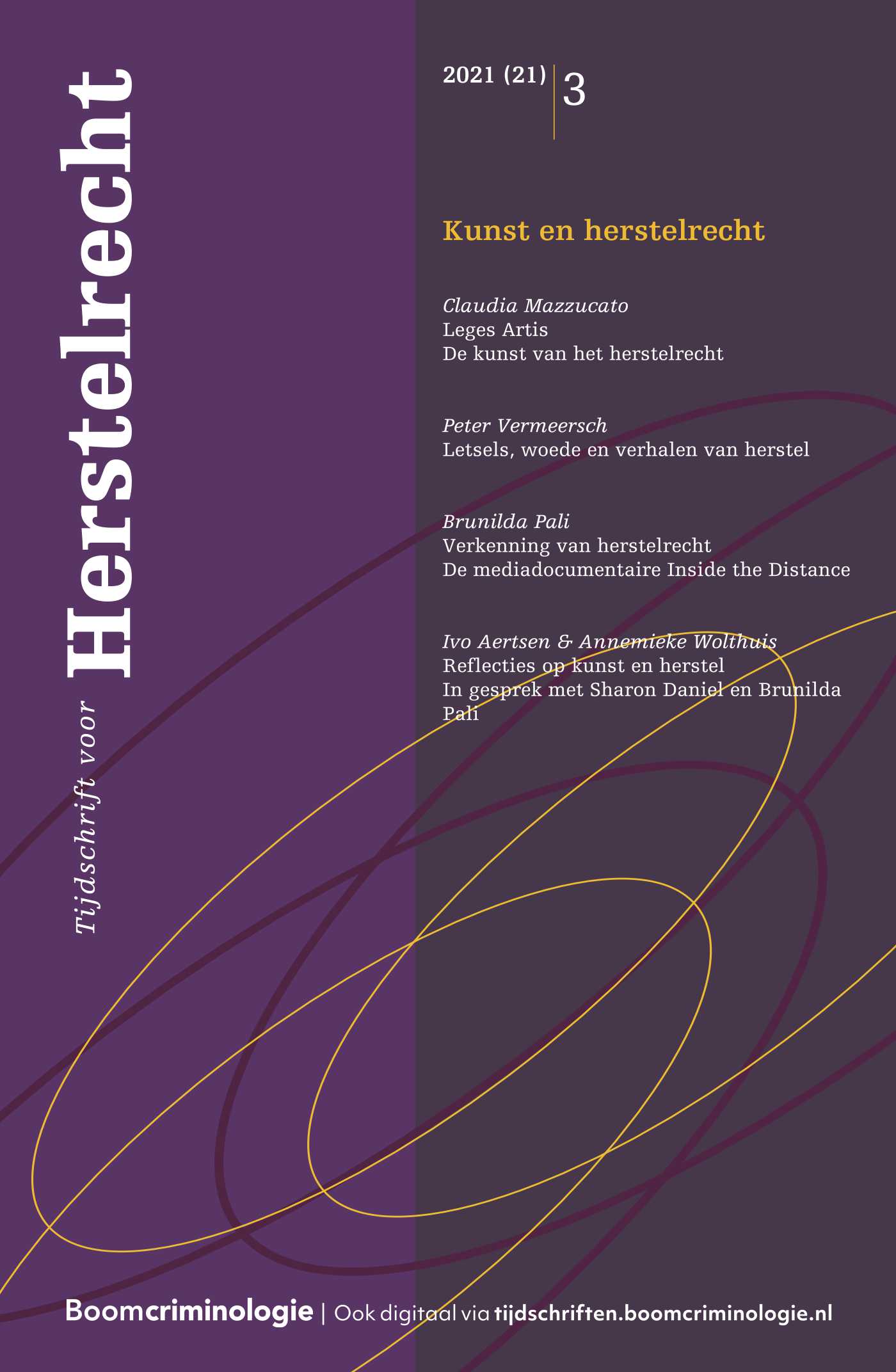|
In een column geeft een redacteur of auteur zijn of haar visie op een bepaald onderwerp. |


Tijdschrift voor Herstelrecht
Meer op het gebied van Mediation en herstelrecht
Over dit tijdschriftMeld u zich hier aan voor de attendering op dit tijdschrift zodat u direct een mail ontvangt als er een nieuw digitaal nummer is verschenen en u de artikelen online kunt lezen.
| Column |
Verhaal halen |
| Auteurs | Loek Dijkman |
| SamenvattingAuteursinformatie |
| Redactioneel |
Een breder wordende rivier vraagt om meer water |
| Auteurs | Bas van Stokkom en John Blad |
| SamenvattingAuteursinformatie |
|
In een redactioneel artikel geeft de redactie een toelichting op het tijdschriftnummer in kwestie. |
| Artikel |
Een constructief antwoord op (jeugd)delinquentie: recidive verminderen?Reflecties over ‘managerialism’ in België en Nederland |
| Trefwoorden | herstelgericht groepsoverleg, recidive, jeugddelinquentie, managerialism |
| Auteurs | Inge Vanfraechem |
| SamenvattingAuteursinformatie |
|
Responding to criticism, stating that constructive interventions can only be understood as proven to reduce recidivism, the author clarifies what she conceives as constructive answers to juvenile delinquency, against the background of the Belgian developments in law and policy. ‘Constructive’ has always implied the active participation of those citizens directly involved, care and attention for the victims needs, and the avoidance of placement in a closed institution. The contribution to the quality of social life by making restorative gestures was considered to be of importance.To measure whether conferencing with juveniles would work the criterion of reducing recidivism is important, but not exclusive. Other criteria, which come forward in qualitative research, are at least as important.The Dutch seem to take managerialism in the sense of implementing only what can be proven to work in a preconceived way – only in terms of reducing recidivism – much more seriously than the Belgians do.In Belgium the traditional stress on protection of juveniles has not changed, and the newly introduced family group conferences were accepted as valuable procedures. Reducing recidivism is however not unimportant and more and more RJ-research is addressing this issue. There are indications that recidivism can be reduced by conferencing procedures and their resolutions. Instead of technocratic managerialism one should be interested in the ‘moral performance’ of a legal system, looking for what really matters. |
| Artikel |
Een maximalistische visie op herstelrecht |
| Trefwoorden | maximalisme |
| Auteurs | Lode Walgrave |
| SamenvattingAuteursinformatie |
|
In this article the author summarizes the main arguments for and notions of a maximalist conception of restorative justice, as developed in his latest book: Restorative Justice, Self-interest and Responsible Citizenship.While using a rather limited, goal-oriented definition of RJ as ‘an option for doing justice after the occurrence of an offence that is primarily oriented towards repairing the individual, relational and social harm caused by that offence’, Walgrave aims at developing a full blown alternative for penal justice. In the restorative system it should also be possible to impose sanctions, when deliberative processes of mediation and conferencing are not feasible, although the latter have, of course, the greatest chance of achieving restoration.The sanctions of restorative justice are not punishments, because any intention to impose suffering is lacking at the side of the sentencing authorities. But RJ can be seen as a form of inverted retributivism, in the sense that the offender pays his dues back to the victim and the society, to a degree that has to be acceptable to all involved, and seeking a fair amount of proportionality that does not impose unrealistic or unfair obligations. Principles of due process of law should be adapted to fit the restorative process. The high degree of participation in restorative justice serves democracy and so should criminology, by studying the ways in which social capital can be increased.The concept of ‘common self-interest’ is explained as the fundamental understanding that self-interests are best served by serving the common self-interest in as far as that provides full possibilities of deployment to everyone. |
| Discussie |
Waarom herstel niet tot de kerntaken behoortBedenkingen bij Walgraves rechtsonbehagen |
| Auteurs | Paul De Hert |
| Auteursinformatie |
| Discussie |
Geen herstelrecht maar rechtsherstel |
| Auteurs | Pauline Westerman |
| Auteursinformatie |
| Discussie |
Herstelrecht, eigenbelang en verantwoord burgerschapEnkele reacties op het boek met dezelfde titel van Lode Walgrave |
| Auteurs | John Blad |
| Auteursinformatie |
| Praktijk |
Criminologie en criminaliteitsbeleid: tussen mensenrechten en doeltreffende criminaliteitsbeheersingVerslag van de IX. Conference of the European Society of Criminology, Ljubljana, Slovenië, 9-12 september 2009, met als titel ‘Between Human Rights and Effective Crime Control’ |
| Trefwoorden | Conference of the European Society of Criminology |
| Auteurs | Katrien Lauwaert en Annemieke Wolthuis |
| Auteursinformatie |
